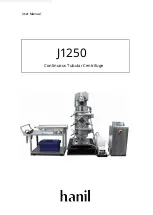
PAGE 4
Limited Warranty
Quincy Lab, Inc. warrants to the original purchaser that this product will be free from defects in material and
workmanship under normal use throughout the warranty period. The standard warranty period for this
instrument is eighteen months from date of shipment. The instrument warranty is
supplemented with a three year warranty on
the heating element. Please refer to your
invoice or shipping documents to determine the active warranty period. This warranty covers
parts & labor (labor at factory only) and shipping cost for replacement parts.
Technical Support
Temperature Dial Calibration
If you have any questions or need technical assistance, please contact Quincy Lab
Tech Support at
Email:
Quincy
Lab,
Inc.
Voice:
800-482-HEAT (4328)
1925 N Leamington Ave
Fax:
773-622-2282
Chicago, Illinois 60639
Visit us on the web at www.quincylab.com
Periodic Oven Maintenance
The GC series Lab Ovens are designed to be virtually maintenance free. But operational safety requires periodic
cleaning and chamber temperature accuracy verification. Periodically check the rear air intake vents for dirt or
dust build-up. Keep the intake & exit ports clear of obstruction, dust and dirt. Once a year, check the actual oven
chamber temperature against a known accurate temperature measurement device. Maintain temperature dial
accuracy to /-15 degrees F of the control setting. Calibrate the control as necessary. To clean exterior
and interior surfaces, use a damp cloth or an all-purpose cleaner. Avoid commercially available oven cleaners.
Don't overload the unit with large (in quantity OR size), or high-density loads. This will restrict air flow and result in
non-uniform processing and long or impossible "heat-through" times. To help determine a large load's suitability,
use the set point recovery time (the time it takes for the temperature to recover to the original set temperature
once load is placed), as a guide. To reduce recovery time, reduce load proportionally.
NOTE:
The set point of the thermostat or chamber temperature stability can be affected by changes in ambient
(room) temperature and/or equipment running on the same electrical circuit. Take time to see how unit location or
changes in room temperature from seasonal heating or air conditioning may influence the oven's set temperature.
Isolate the oven on a separate circuit when possible.
The unit's minimum operating temperature is largely determined by ambient temperature. The unit can operate 25
degrees F (15 degrees C) above room temperature but temperature stability will be degraded. Stability improves
appreciably for settings that exceed ambient by 40 degrees F (20 degrees C) or better.
Chamber Loading
(continued)
+
-
Calibrating the actual chamber temperature to the temperature
printed on the knob/dial, should only be done if the chamber
temperature, as measured by a known accurate device, is off by
more than +/- 15
o
F (8
o
C) from any indicated dial setting. The
most accurate calibration possible for any analog-type control is
at a single temperature setting. Therefore, calibrate the control
at the most frequently used temperature.
To calibrate: Set dial temperature to a frequently used
temperature then remove knob (allen screw). Be careful not to
move the position of the shaft when removing the knob. Allow
oven to achieve a stable temperature. Remove compression pin
(newer models only) to access the trim-screw recessed in shaft
center. Using a small blade driver, turn the trim-screw clockwise
(CW) to adjust temperature down and (CCW) to adjust the
temperature upward. Make only small 1/16th adjustments at a
time. Allow the temperature to settle before making any
subsequent adjustments. NOTE: Use pliers to keep outer shaft
from turning when making trim-screw adjustments.
Do not adjust control to operate above
the oven's stated maximum operating
temperature.






















